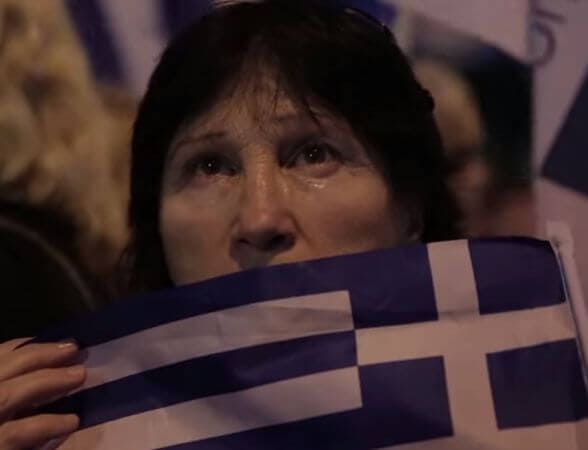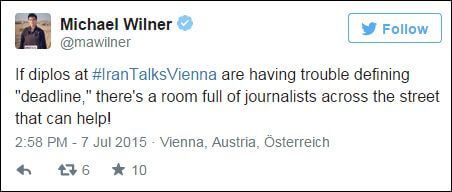Today’s Top Stories
1. Nuclear negotiators agreed to extend the talks deadline till Friday. According to Haaretz, an agreement might be reached by this weekend. Iran’s latest demand is for an end to an arms embargo:
So far, the Americans, British and French have refused to discuss this demand, because the sanctions on arms sales aren’t related to Iran’s nuclear program, but to the fear that Tehran will transfer weaponry to various Mideast terrorist organizations. But it’s not yet clear whether this is an unequivocal Iranian demand or a mere negotiating tactic aimed at achieving concessions in other areas.
More at the Daily Telegraph.
2. Does an annex to the nuclear accords recognize Iranian spheres of influence in the Levant as legitimate?
3. Six Israeli-Arabs (four of whom were teachers in a Bedouin village) were arrested by Israel for supporting Islamic State and spreading its ideology. Three of the group allegedly had previously joined Islamic State fighters in Syria. CNN writes:
Police say the teacher would sing songs praising ISIS in class, express his support for the terrorist organization, and show students map drawings of the self-proclaimed Islamic State — the group’s preferred moniker, and also the way it refers to its wide swath of territory across Syria and Iraq.
4. Frank Luntz Sounds the Alarm on US Support, BDS: Is BDS gaining the ear of the Democratic Party?
5. HR Radio: NYT or CNN: Which Is Worse? Did IDF soldiers kill a Palestinian terrorist for “no reason?” And what to make of CNN’s claim that Jerusalem’s Old City is on verge of extinction? Click on the image to listen to Yarden Frankl’s interview on the Voice of Israel.
Israel and the Palestinians
• YNet: Hamas-Fatah tensions are escalating. The number of Hamas figures arrested in the PA’s latest West Bank dragnet is up to 170.
• The Daily Telegraph removed a timeline from the bottom of a story marking the anniversary of last year’s Gaza war. The problem? A mistaken assertion that the three Israeli teenagers kidnapped in June were killed by “live IDF fire.” We were in touch with the Telegraph, asking editors to simply correct the error. Maybe they’re fact-checking the entire timeline before restoring it?
• The Finance Ministry crunched some numbers to get a sense of how damaging an international boycott of Israel would be. Scenarios vary between politically sanctioned and unofficial boycotts, and whether they’d apply to all Israel or just settlements. The Times of Israel writes:
In an extreme scenario, where the EU boycotts all Israeli products and stops foreign investments in the country – sanctions similar to those imposed on Apartheid South Africa – 36,500 people would be jobless and Israel would lose NIS 40 billion [$10.5 billion] in revenue annually.
• The Associated Press took a closer look at the boycott, divestment and sanctions (BDS) campaign against Israel. Thumbs up to reporter Tia Goldenberg for following up on this point about BDS bigshot Omar Barghouti. He’s so hypocritical.
Barghouti, a U.S.-educated engineer who is also pursuing a graduate degree at Israel’s Tel Aviv University, said the BDS movement is “completely neutral” on the political solution to the conflict. But he said he represents the Palestinian “consensus,” and any deal that “undermines our basic rights under international law and perpetuates the colonial oppression” is unacceptable.
As for his attendance at a university he asks others to boycott, he said Palestinians “cannot possibly observe the same boycott guidelines as asked of internationals,” adding that the “indigenous population” is entitled to all services they can get from the system.
If Palestinians really can’t observe the same boycott guidelines asked of internationals, what’s wrong with Palestinians working for good wages in, say, a West Bank SodaStream factory?

• BBC journalist John Ware spoke out against his corporation’s news coverage of Israel.
He said the BBC had failed to scrutinise the Palestinian side of the conflict.
“I do think there is a deficit – and it’s a point I have often made to the BBC,” he added.
“Western media outlets as a whole, do not [look at] the individuals and culture of the Palestinian side of the conflict anything like the same extent the Israeli side is scrutinised.
“I think that is a deficit and needs to be dealt with.
“I think if it was dealt with people would have a much better understanding of the more polarised positions that people think the Israelis take.”
• It’s not clear what prompted this, but two Palestinian prisoners temporarily suspended their hunger strikes. Can you do that during Ramadan?
• A Palestinian envoy to Chile was caught on video denying the existence of Jewish people.
• Reporter Ben Lynfield of The Independent visited Kibbutz Nirim, one of many Israeli communities near the Gaza border. People injured in mortar attacks are still recovering, kids are still dealing with trauma, and not everyone wants to stay.
However, she added that her own daughter, whose wedding last July had to be moved to another venue because of rocket fire, wants to leave.
“She had a baby two months ago and she wants to live any place but here because she’s scared. Ever since she was a little kid she’s been scared of infiltrations. I used to be able to tell her, ‘Don’t worry, there are guards and the army’. But now with tunnels that popped up so significantly into our awareness during the last war I can’t tell her that it’s an illogical fear. A tunnel can pop up into the middle of our community.”
• Correction of the Day, from AP:
In a story June 30 about Palestinian protesters whitewashing a gay pride rainbow flag, The Associated Press reported erroneously that homosexual acts are banned by law in the West Bank and Gaza Strip. While homosexuality is largely taboo in Palestinian society, there are no laws specifically banning homosexual acts.
A fair enough correction. Of course, there wouldn’t be any laws protecting gay Palestinians when they’re beaten to a pulp by other homophobic Palestinians . . .
Mideast Matters
• Tweet of the Day, from Michael Wilner in Vienna:
• Reuters takes a closer look at what the end of sanctions would mean for Iran’s Revolutionary Guards and its financial empire.
A Western diplomat who follows Iran closely told Reuters that the IRGC’s recent annual turnover from all of its business activities was estimated to be around $10-12 billion.
Iranian officials refuse to reveal the IRGC’s market share, but $12 billion would be around a sixth of Iran’s declared GDP, at current exchange rates.
“They control major companies, and businesses in Iran such as tourism, transportation, energy, construction, telecommunication and Internet,” said an Iranian official in Tehran who asked not to be named.
• The White House is already considering a Mideast strategy for after a nuclear agreement with Iran. Apparently, President Obama is eyeing a political resolution to the Syrian civil war that includes Bashar Assad’s departure. I wonder if this strategy considered Iran spreading its post-sanctions windfall to friends like Assad and Hezbollah. Which way will the momentum swing when we hear cha-ching echoing in Damascus? The Wall St. Journal (click via Google News) writes:
“There’s a growing sense that momentum has turned against Assad and that is feeding a belief that there could be more opening on the political track.”
The White House still insists Iran will use the money to fix its economy.
• Syrian rebels threatened to cut off water to Damascus if the Assad regime and Hezbollah don’t call off an offensive against Zabadani, a city near the Lebanese border. A militia called Wadi Barada controls a spring northwest of Damascus from which the capital’s water is piped.
Around the World
• Amid their country’s financial crisis, Greek Jews struggle and brace for more turmoil.

• UK protesters shut down Israeli-owned drone factories in Staffordshire and Kent. More at Haaretz and the BBC.
• Of the 130 flags flying at a Milan expo, only Israel’s has been vandalized repeatedly.
• Now that Amazon is no longer selling merchandise featuring Confederate flags, the Los Angeles Times looks at what this means for efforts to get Holocaust-denying books removed as well.
• Meanwhile in France:
– Surge in French aliyah spurred by start-up nation
– Explosives stolen from army base in France
Commentary/Analysis
• Elliott Abrams articulates why it matters to Americans that Egypt is crafting a law forbidding journalists from reporting terror stats that differ from government sources:
But eliminating freedom of the press is not a step toward crushing terrorism, and in fact it is harmful to the effort. The Egyptian public deserves to know how its government is performing, and Army press releases are not a reliable source of information.
Same goes for Americans, who are contributing $1.3 billion in military aid to Egypt. We, and the Congress, have the right to know how the battle is going, how the Egyptians are performing, what kind of aid or training might be more effective, and whether the aid should be continued. It will be a lot harder to find out when Egypt’s best journalists are in prison, in exile, or silenced by fear.
• Here’s an interesting question posed by Charles Dunlap:
• India abstention from the UN Human Rights Council vote to adopt the Schabas report caught the attention of the Indian media. If you’re interested in how what they’re saying in India, commentary in The Diplomat, Indian Express, and Outlook. Meanwhile, The Hindu got reactions from the PA’s envoy to India.
• Here’s what else I’m reading today:
– Kenneth Marcus: Why universities need a definition of anti-Semitism
– Nazir Mgally: The boat to Gaza: neither freedom, nor a flotilla
– Jonathan Schanzer: America and Israel are letting their enemies kill each other
– Aaron David Miller: Is no nuclear deal with Iran a better outcome for Obama?
– Dennis Ross: On Iran, worry about the deal, not the deadline
• See also staff-eds in the Washington Post (US response to Iran’s cheating is worrying omen), and Pittsburgh Post-Gazette (Hamas and Israel must account for Gaza violence).
Featured image: CC BY Jon S via flickr with additions by HonestReporting; Ware via YouTube/BBC Academy:Journalism; Greee via YouTube/VICE News;
For more, see yesterday’s Israel Daily News Stream and join the IDNS on Facebook.





